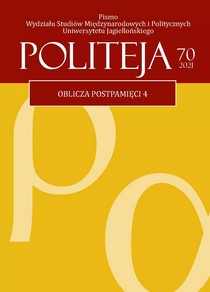MODELE PAMIĘCI O HOLOKAUŚCIE NA UKRAINIE W KONTEKŚCIE MARGINALNOŚCI I MARGINALIZACJI DYSKURSÓW PAMIĘCI
MODELS OF MEMORY ABOUT THE HOLOCAUST IN UKRAINE IN THE CONTEXT OF MARGINALITY AND MARGINALIZATION OF MEMORY DISCOURSE
Author(s): Katarzyna JędraszczykSubject(s): Studies in violence and power, Nationalism Studies, History of the Holocaust, History of Antisemitism, Politics of History/Memory, Peace and Conflict Studies
Published by: KSIĘGARNIA AKADEMICKA Sp. z o.o.
Keywords: Holocaust; Ukraine; memory; narratives; historiography; memory politics; post-memory;
Summary/Abstract: There are two main models of memory in Ukraine: nationalist and post-Soviet. After 1991, Ukrainian historiography concerning the Holokaust was influenced by Soviet and emigration historiography. It was reactive to the allegations that the Ukrainians are anti-Semitic. In the nationalist model of memory, there is no space for the memory of the Holokaust in Ukraine, it is rather a strategy of displacing trauma and guilt or emphasizing the contribution of Ukrainians to saving Jews. The post-Soviet model also goes without a narrative about the Holokaust, but rather because of the lack of tradition in the USSR of describing war as a multi-ethnic experience. In this sense, both models are similar – both are mono-ethnic narratives. The minority discourse (ethnic model) about the Holokaust in Ukraine has not yet advanced to the rank of a nationwide narrative.
Journal: Politeja - Pismo Wydziału Studiów Międzynarodowych i Politycznych Uniwersytetu Jagiellońskiego
- Issue Year: 18/2021
- Issue No: 70
- Page Range: 43-56
- Page Count: 14
- Language: Polish

